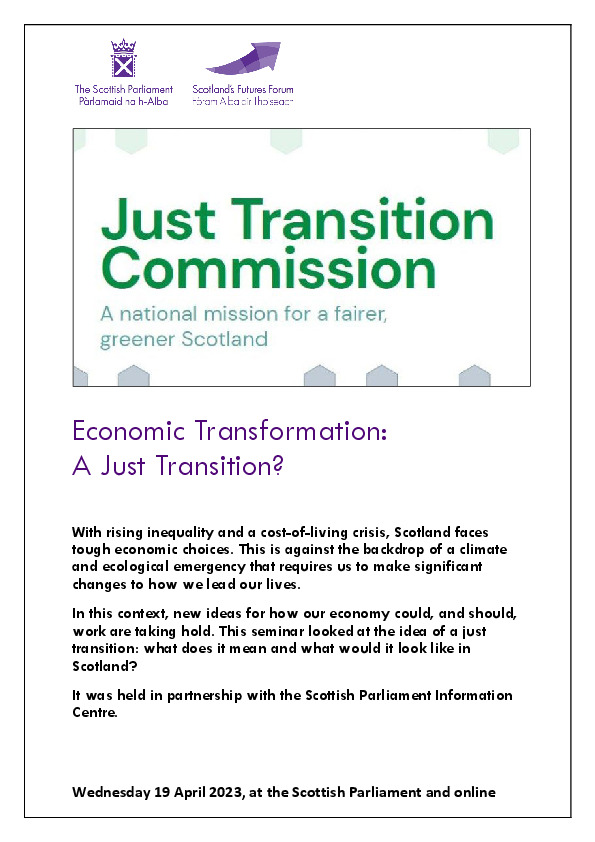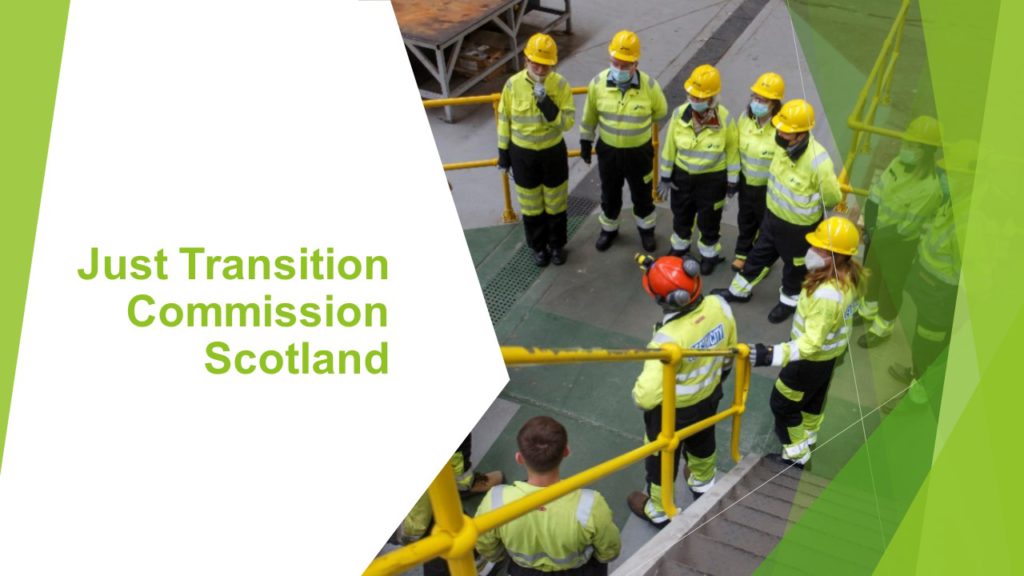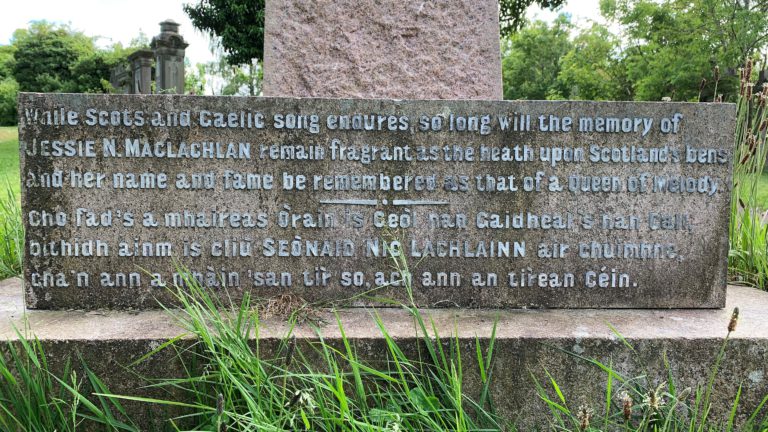Economic Transformation: A Just Transition?
Wednesday 24 April 2023, at the Scottish Parliament
With rising inequality and a cost-of-living crisis, Scotland faces difficult economic choices. This is against the backdrop of a climate and ecological emergency that requires us to make significant changes to how we lead our lives.
In this context, new ideas for how our economy could, and should, work are taking hold. This seminar looked at the idea of a just transition: what does it mean and what would it look like in Scotland?
Introduction
How can Scotland make the change to a net zero economy in the coming decade while meeting current economic challenges such as rising inequality and an ageing population, and addressing the climate emergency?
This seminar, chaired by Claire Baker MSP, convener of the Economy and Fair Work Committee, explored the idea of a just transition.
Participants discussed the work of the independent Just Transition Commission and considered what a just transition looks like, how the agenda is progressing and what it should mean for policy decisions in Scotland.
Panel
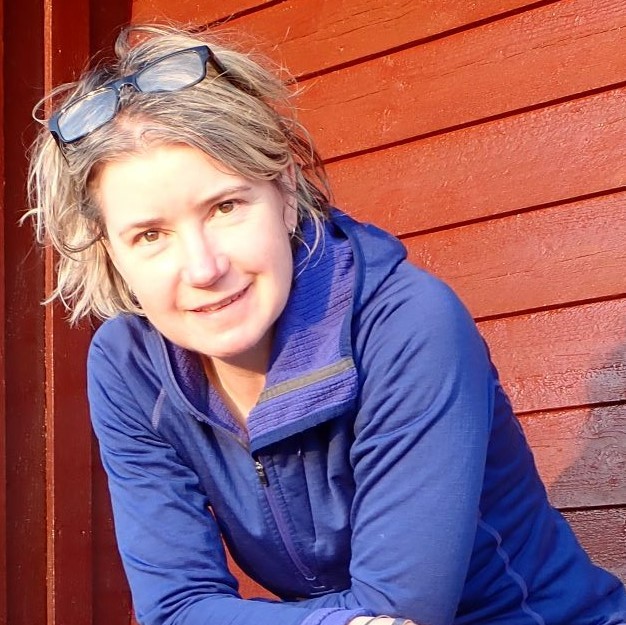
Dr Deborah J Long FRSGS is a trained Palaeoecologist. Since 2019, Deborah has been Chief Officer at Scottish Environment LINK – the network for environmental non-governmental organisations in Scotland, whose aim is to be a strong coherent voice in pursuit of a sustainable Scotland. She is a Fellow of the Royal Scottish Geographical Society and an active board member of a number of charities in Scotland – including the Royal Zoological Society of Scotland – who work on conservation, environmental rights and third-sector leadership.
Chair
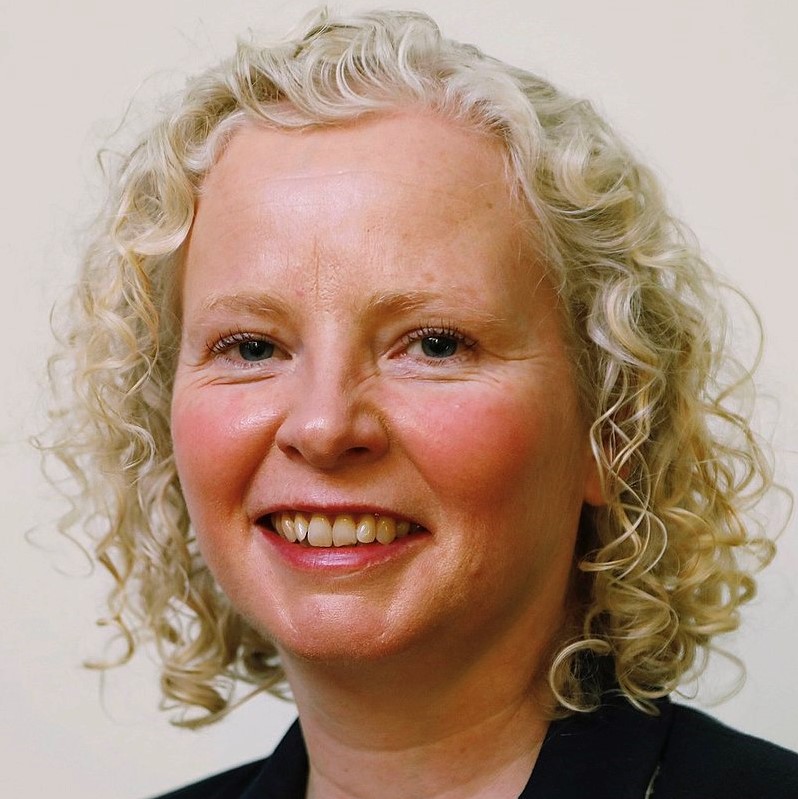
Claire Baker MSP is a member for the Mid Scotland and Fife parliamentary region and convener of the Scottish Parliament’s Economy and Fair Work Committee.
Presentation
Introducing the work of the Just Transition Commission: Dr Deborah Long
No one left behind
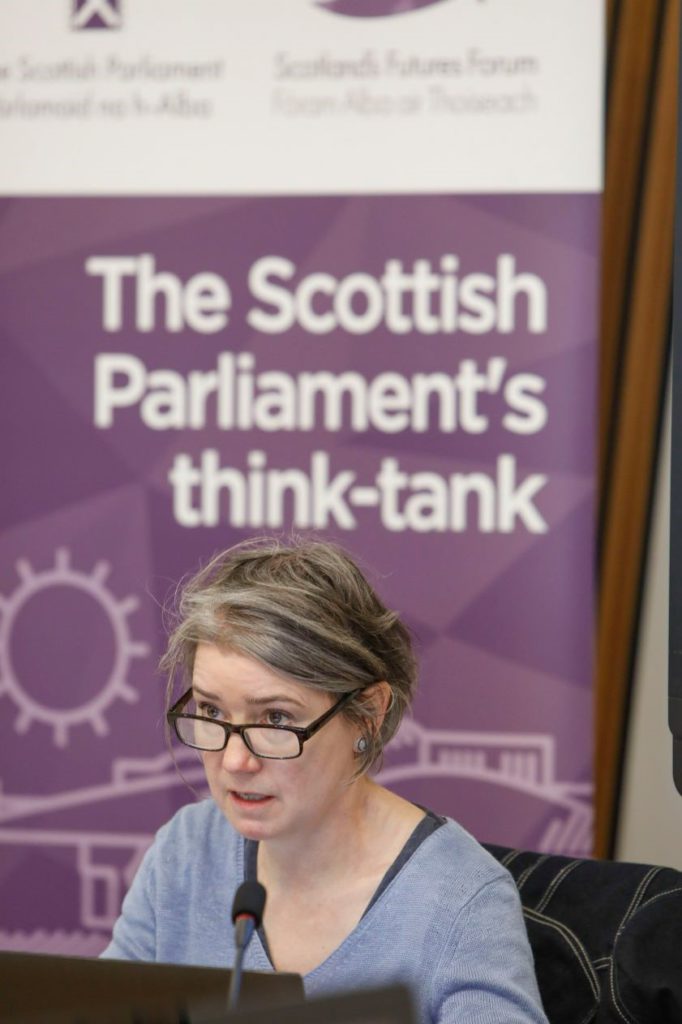
What is a just transition? The Scottish Government defines it as:
how we get to a net zero and climate resilient economy in a way that delivers fairness and tackles inequality and injustice
As Deborah highlighted, the concept is embedded in Scotland’s climate change legislation and in the Scottish Government’s 2020 Environment Strategy. It acknowledges that meeting the challenging emissions and forthcoming nature targets will require rapid and structural change, which will impact on all sectors of our economy and must be managed correctly.
The opportunities and risks brought about by transition will vary between regions, industries and individuals, and part of the Commission’s job is to learn from negative past experiences of change.
Key principles of a just transition:
- It unites economic, social, and environmental objectives
- It is both an outcome and a process
- Opportunities and risks will vary
- It aims to ensure that no one is left behind
Opportunities and challenges
As Deborah outlined, just transition is a long-term objective that must be embedded across Government and beyond. This brings both opportunities and challenges.
Opportunities will include greater participation, engagement and empowerment of people and communities in decision making, as well as the chance to tackle inequalities between generations, places and communities, leading to a fairer, stronger and more prosperous society.
One challenge is how we provide tangible support for people to retrain and access jobs in a net zero, nature-positive economy, avoiding structural unemployment from rapid change.
How did we get here?
Work on a just transition to a low-carbon economy started in 2009, and the 2015 Paris Agreement highlighted the concept as an imperative. In Scotland, the Just Transition Partnership was formed in 2016, and the 2018 programme for government included a commitment to establish a just transition commission to advise ministers on how to maximise the opportunities and manage the challenges of decarbonisation in relation to fair work, reducing inequalities and delivering a sustainable and inclusive labour market.
From 2019 to 2021, the first Just Transition Commission focused on strategic development and wide engagement across Scotland and produced its report on “A national mission for a fairer, greener Scotland” in March 2021. The report emphasised the importance of Government working in social partnership with trade unions, communities and business to deliver in accordance with four key themes:
- Pursue an orderly and managed transition that creates benefits and opportunities for people across Scotland
- Equip people with the knowledge and skills they need across the whole education system
- Empower and invigorate our communities to tackle existing inequalities and avoid new ones arising
- Share the benefits widely and the burdens based on ability to pay
The second Just Transition Commission, which will operate for the duration of the current session of Parliament, draws in expertise from industry, business, trade unions, academia, and environmental and community organisations. Its overall mission remains the same: a fair transition to net zero emissions in Scotland, undertaken in partnership with those impacted by the transition. It is tasked with providing scrutiny and advice, producing annual reports, and gathering evidence on assorted topics including employment creation, regional cohesion and social inclusion.
Its remit includes five key tasks:
- listen and learn from those most impacted
- advise on monitoring and evaluation
- report annually on Scotland’s progress
- collaborate with other expert bodies
- provide robust scrutiny and advice on just transition plans
Keeping justice at the heart of change
The second Commission’s initial report “Making the Future”, published in 2022, set out the priorities in delivering a just transition for Scotland. It had a key focus on keeping justice at the heart of all net zero nature-positive plans to make the most of the huge potential opportunities for a fairer and healthier society and country; to build clear and credible plans to deliver on Scotland’s international reputation; to confront the big challenges early on and over the next few decades; and to make lives better today and in the future.
The report was guided by five principles:
- Clarity: Government must be clear and up front about strategic decisions on just transition delivery and on investment and regulation.
- Urgency: The cost-of-living emergency means that ensuring fairness in the delivery of decarbonisation is more urgent than ever.
- Coordination: Sectoral and regional planning need to be joined up, with annual targets, delivery and investment plans, and clear and shared strategic objectives.
- Justice: Policy needs to address inequalities rather than widen them.
- Credibility: Plans and targets need to be deliverable and supported by adequate funding, and tough questions must be confronted.
The report contains a set of high-level messages:
- Close the investment gap – delivering high-quality investment to create highly skilled, secure, well-paid jobs, tackle inequality and build an innovative industrial base and a more resilient and social infrastructure.
- Establish industrial planning for the economy of the future – whole-system transformation requires a novel approach, moving towards tangible annual milestones and setting the direction for public and private stakeholders.
- Deliver a better deal for workers – plans need to be geared towards not just job creation but delivering meaningful, well-paid and secure employment at scale.
- Tackle inequalities at every level – policy development should be rigorously assessed to ensure maximum social and economic impact and fair distribution of benefits, prioritising engagement with the most marginalised groups, including internationally.
- Measure progress to secure implementation – developing and rapidly deploying a robust monitoring evaluation framework for assessing progress on our just transition outcomes to drive delivery, including earlier identification of opportunities and risks.
Costs and benefits
As Deborah outlined, the Commission’s initial advice to Government in February 2023 set out some high-level considerations for sectoral just transition plans.
They should cover inequalities, assessing the current state of each sector; scale and quantification, reflecting the comparative importance of each element of the strategy in delivering a just transition; equity, mapping costs and benefits and who is vulnerable to negative impacts; fair work as a central focus; road maps for interdependencies between actions and outcomes; risk management through a detailed and credible assessment of key risks and actions to mitigate them; engagement and co-design, which must shape all the plans; finance and investment to support a just transition, with Scotland leading the way in community finance; mainstreaming of the concept; and accessibility for people now and in the future.
Co-operation and co-ordination
In April 2023, the Commission provided further advice to the Scottish Government on its Draft Energy Strategy and Just Transition Plan relating to justice, demand, materiality and co-operation and coordination. Currently, the Commission is working on the responses to the current plan and providing advice on the upcoming sectoral plans. It is also focusing on engagement, participation and equalities, and advising on monitoring and evaluation, drawing on best practice and seeking to maintain open dialogue.
What next? Some questions to consider
Deborah raised some broad questions relating to the work of the Commission and how Scotland can succeed in delivering a just transition. For example, how we embed the principles more widely and embed fairness across all sectors? How do we ensure that change is fast but also fair? How do we ensure that those who will be most affected, including future generations, have a voice? How do we create space for communities to lead to strengthen diversity and maximise social economic outcomes?
Q & A Session
In the Q&A session, Deborah was supported by Elliot Ross, head of secretariat for the Just Transition Commission.
Taking the questions raised by Deborah as a jumping-off point, participants discussed the challenges, tensions and opportunities around a just transition. The importance of engagement and communications was highlighted, along with monitoring of progress and funding, and long-term versus short-term aspirations.
The discussion also touched on examples of where just transition is and is not working so far, the international context and the need for strategic focus in the context of a broader approach.
“How do we navigate something so big?”
To kick off, the sheer scale of the just transition agenda was highlighted, and it was questioned whether we need to take a much broader view, including areas that currently receive less attention.
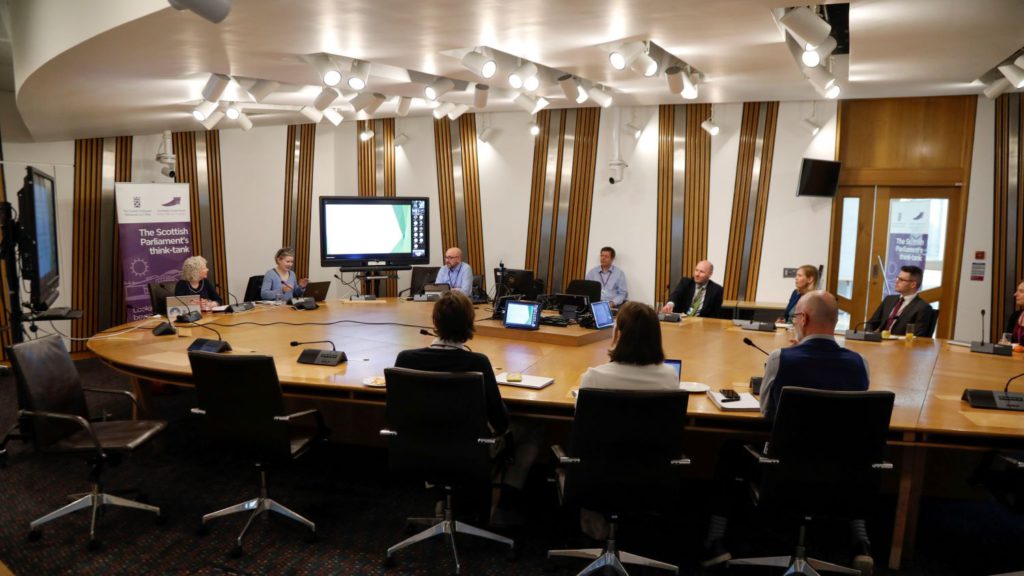
Deborah reiterated a key question raised in her presentation: how do we ensure that we make changes now to enable communities to continue to function and to be fair to those involved in industry while attempting to build a good legacy for future generations? Participants explored the tensions arising in that regard—for instance, can work take place at governmental level in parallel with scrutiny from both the Commission and Parliament? Do we have to prove success in one area, or just take a risk?
The issue of time pressure was emphasised, given that—as Deborah noted—action on biodiversity loss is so urgently required. A dilemma was identified: we must move quickly, but that means we might not always get things right.
Deborah argued that we cannot afford to approach these issues sequentially—actions need to be taken in parallel, which is a challenge for us all. Elliot reiterated the focus on urgency, stressing that the agenda is already being advanced even as key challenges continue to be identified. He highlighted the Commission’s big message: for the concept of just transition to be convincing and to get democratic buy-in, it needs to prove itself in the here and now, not only in 10, 20 or 30 years.
An integral part of the journey
To secure swift change that brings benefits in both the short and long term, Deborah emphasised the importance of involving everyone, and the crucial role of engagement. She reiterated the central question of how we ensure that everyone has a voice and wants to help deliver change. Elliot argued that the public perception of just transition and what it means in practice is a key part of successful delivery. He stressed that communication and messaging should be viewed not as a marginal issue, but as an integral part of the just transition journey, as it is essential that people understand the agenda and how it is being progressed.
A question was raised about the Just Transition Commission’s specific role in that regard: how does the Commission ensure that its messages are getting through to public agencies and local government, where a lot of the delivery will lie?
Deborah noted that the JTC’s reports are published online, and described how the Commission goes out to visit different sites to learn about issues at a local community level. She emphasised that it talks to many different stakeholders to gather views, which then feed into its advice to the Scottish Government.
“Where is the win-win?”
As the Commission seeks to increase public awareness of the just transition concept, participants discussed whether there are good examples of areas where we can see change happening already, and concrete actions or evidence that can be highlighted to show where implementation is or is not working.
Deborah highlighted community benefit as one area in which some form of just transition is taking place, although it is not happening quickly enough yet. She pointed out that community-owned onshore wind farms, for example, can be viewed as the start of a process that could serve as a pilot for how we might move forward with other substantial changes. Conversely, Deborah highlighted agricultural subsidies as an area where the just transition agenda needs to make more progress, as more money currently goes to larger farmers while smaller crofters who do more for nature get a much smaller slice of the pie.
Elliot expressed his hope that there would be more success stories soon and highlighted the Commission’s role in pushing Government to do more and act faster and more comprehensively. As a positive, he pointed to the strong international recognition of what Scotland has been doing in the just transition space.
Returning to the theme of engagement, he also emphasised the success of the Scottish Government’s extensive efforts to connect with impacted communities and hard-to-reach groups, not just the usual suspects. As a specific example of excellent work, Elliot discussed the implementation of low-emission zones in Dundee, where just transition thinking has included an acknowledgement of the need for engagement with local communities, vulnerable or marginalised groups. He also argued that peatland restoration offers huge possibilities for success in job creation and could represent a genuine win-win opportunity in the just transition journey.
“A clear and credible picture”
Participants raised access to funding as an issue and asked whether the Commission had considered that aspect in detail. It was pointed out that the scale of the funding required to deliver a just transition is staggering, and that that can be achieved only through a combination of public and private funding.
Deborah argued that while just transition is a massive opportunity for Scotland, we need to ensure that we take the right approach when it comes to finance. Elliot noted that public finances can play a vanguard role as a catalyst, and Deborah agreed that the public sector should lead by example, for instance through driving forward procurement in compliance with the just transition aims. The need to consider the international dimension was again emphasised: how do we learn lessons from other countries? However, the international context was also flagged up as presenting a challenge in some respects—for example, as Scotland seeks to compete with the European Union’s Green Deal.
Elliot stressed that it is crucial to understand what finance is required, where it can come from and the timing of it, and he argued that more detail is needed from the Scottish Government in that regard. He linked back to the theme of the tension between the need for immediate gains and the need to build sustainable financial models for the longer term.
Participants highlighted the importance of investable packages for private institutions at scale, and Elliot emphasised the need for concrete thinking about specific needs and clear expectations for private finance. It was pointed out that this highlights the value of strategic clarity from Government; we need a clear and credible picture of what is going to happen where, as that will create a much more favourable investment climate.
“Nobody has really cracked this”
Returning to Deborah’s points about monitoring and evaluation, participants asked what sort of work the Commission was doing in that space, and how Parliament, across all its committees, could learn from the Commission’s approach in that respect.
As Elliot outlined, monitoring progress on the just transition agenda is challenging, which linked in with other themes that participants flagged up. For example, the sheer breadth of the agenda makes evaluation difficult, and Elliot emphasised that we need to understand where it begins and ends, what the key metrics and indicators are and the existing data landscape. Elliot again stressed the imperative to act fast, and the need therefore to be able to effectively measure progress as soon as possible.
Elliot argued that although the Scottish Government has looked at how countries around the world monitor and evaluate their progress against the just transition aspirations, nobody has really cracked it. He highlighted again the need for clarity on core objectives, and flagged up the labour market as a specific area where risks need to be monitored and assessed to provide early warning of issues, such as bottlenecks in certain sectors, so that they can be addressed.
He noted that the Commission has emphasised that assessment of progress should consider not just the end point but the existing state of the sector, considering systemic inequalities and structural factors to ensure that strategy is geared towards a clear and measurable improvement.
Nevertheless, Elliot pointed out that measuring Scotland’s progress on the just transition journey must consider the need for realistic assessment, given that, in striving for both rapid and sustainable change, the perfect may be the enemy of the good.
Partners
The event was hosted jointly with SPICe (Scottish Parliament Information Centre).



